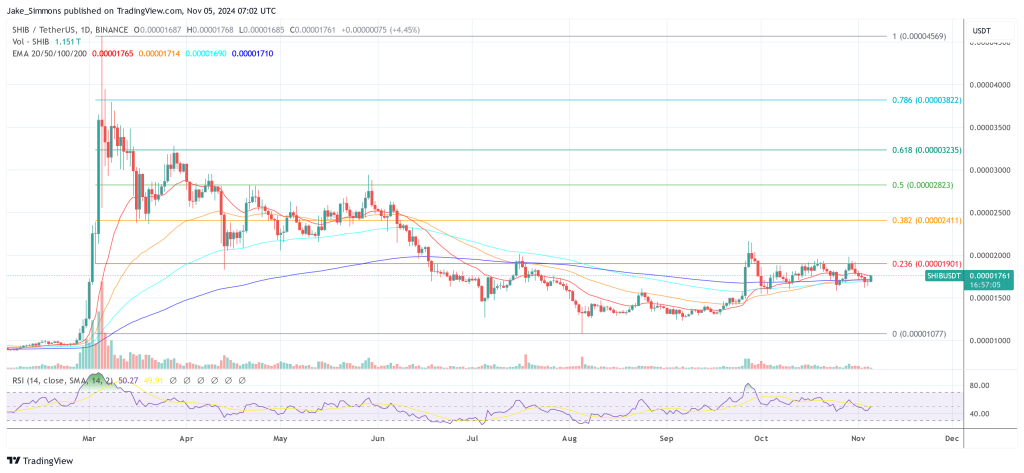ARTICLE AD
Shytoshi Kusama, the lead developer of Shiba Inu, has unveiled an ambitious proposal to establish a “Strategic Hub for Innovation and Blockchain” (S.H.I.B.) in a United States city aka the “The Silicon Valley of Crypto.” Aiming to transform the selected location into a global epicenter for blockchain technology, the initiative seeks to position the US at the forefront of the crypto industry.
Shiba Inu To Lead The Silicon Valley Of Crypto?
In a blog post dated November 5, 2024, Kusama outlines a plan emphasizing economic growth, technological advancement, and environmental sustainability. “By leveraging blockchain’s transformative potential, this S.H.I.B. initiative aims to stimulate economic growth, create high-quality jobs, enhance national security, and reinforce the United States’ leadership in emerging technologies,” the Shiba Inu lead dev states.
Kusama underscores the strategic importance of the hub, emphasizing the necessity for the US to maintain its technological edge. “As global competitors invest heavily in blockchain and digital currencies, it is imperative for the US to maintain its technological edge,” he writes. He also highlights the national security benefits, noting that blockchain technologies like Fully Homomorphic Encryption (FHE) can enhance cybersecurity measures and protect critical infrastructure.
The proposal details a multifaceted plan with estimated costs ranging from $1.3 billion to $2.35 billion over a five- to ten-year period. Infrastructure development forms a significant part of the plan, including investments in physical infrastructure such as state-of-the-art research labs and sustainable facilities powered by renewable energy. “Construction of facilities: Build or sponsor state-of-the-art research labs, incubators, accelerators, co-working spaces, and office complexes designed to foster collaboration,” Kusama proposes.
Digital infrastructure includes the deployment of ultra-high-speed broadband networks and the implementation of city-wide blockchain networks like Shibarium. “Implement Shibarium (and other partner systems) as a city-wide blockchain network for testing and deploying applications. This will keep costs low, and time to implementation fast,” he explains.
Economic incentives are proposed to attract startups and established companies, offering tax breaks, grants, and funding programs. Kusama suggests offering “competitive tax breaks, including reduced corporate tax rates, R&D tax credits, and sales tax exemptions for technology equipment.”
Talent development is another critical component, involving collaborations with educational institutions to create specialized programs in blockchain technology. Kusama advocates for “educational partnerships: Collaborate with local and digital universities and educational institutions to create specialized degree programs, certificates, and courses in blockchain technology.”
A clear regulatory framework is emphasized to encourage innovation while ensuring consumer protection and security. “Establish clear, supportive regulations that encourage innovation while ensuring consumer protection and security,” he writes. The creation of a regulatory sandbox is proposed to allow companies to test new technologies under supervision.
Sustainable practices are integrated throughout the initiative, including powering the hub with renewable energy to minimize carbon footprint. “Power the hub with renewable energy sources to minimize carbon footprint,” Kusama recommended, highlighting the importance of environmental stewardship.
The projected outcomes of the initiative are significant. In the short term (1–2 years), the Shiba Inu lead dev anticipates the creation of approximately 5,000 jobs and an injection of $500 million into the local economy. In the medium term (3–5 years), the plan expects expansion to over 20,000 high-skilled jobs and an annual economic contribution of $2 billion. In the long term (5+ years), the establishment of S.H.I.B. as a world-renowned hub is projected, contributing over $5 billion annually to the economy.
An economic impact analysis projects a substantial return on investment. “Projected return of $10 for every $1 invested over a decade, considering job creation, tax revenues, and economic activity,” Kusama states. Additional benefits include estimated annual increases of $500 million in federal, state, and local tax revenues after the first five years and the attraction of $5 billion in private investments over ten years.
Kusama also highlights the initiative’s contribution to national goals: “It aligns with national priorities of economic growth, technological advancement, national security, and sustainable development.”
He concludes his proposal with a call to action, emphasizing the transformative opportunity the S.H.I.B. initiative presents for the United States. “By taking decisive action, we can secure the nation’s leadership in a technology that will shape the global economy for decades to come,” he emphasized. “Investing in the Strategic Hub for Innovation and Blockchain presents a transformative opportunity for the United States.”
At press time, Shiba Inu traded at $0.00001761.
 Shiba Inu price rises above the 200-day EMA, 1-day chart | Source: SHIBUSDT on TradingView.com
Shiba Inu price rises above the 200-day EMA, 1-day chart | Source: SHIBUSDT on TradingView.com
Featured image created with DALL.E, chart from TradingView.com

 2 weeks ago
8
2 weeks ago
8 

